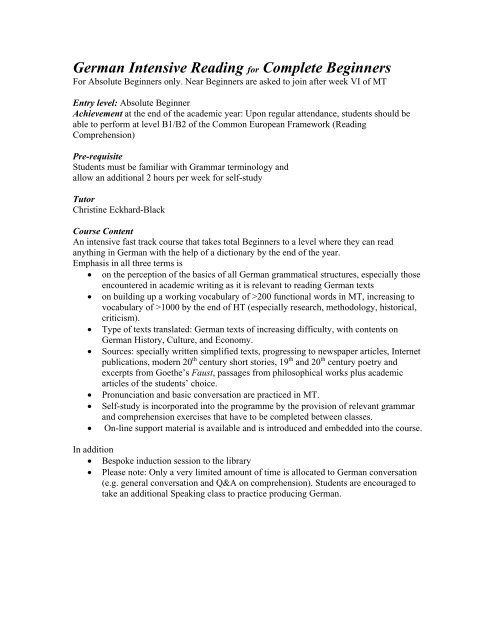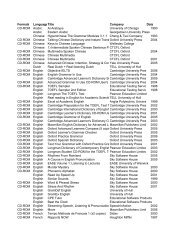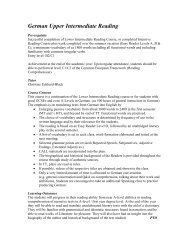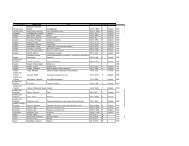German Intensive Reading for Complete Beginners
German Intensive Reading for Complete Beginners
German Intensive Reading for Complete Beginners
Create successful ePaper yourself
Turn your PDF publications into a flip-book with our unique Google optimized e-Paper software.
<strong>German</strong> <strong>Intensive</strong> <strong>Reading</strong> <strong>for</strong> <strong>Complete</strong> <strong>Beginners</strong><br />
For Absolute <strong>Beginners</strong> only. Near <strong>Beginners</strong> are asked to join after week VI of MT<br />
Entry level: Absolute Beginner<br />
Achievement at the end of the academic year: Upon regular attendance, students should be<br />
able to per<strong>for</strong>m at level B1/B2 of the Common European Framework (<strong>Reading</strong><br />
Comprehension)<br />
Pre-requisite<br />
Students must be familiar with Grammar terminology and<br />
allow an additional 2 hours per week <strong>for</strong> self-study<br />
Tutor<br />
Christine Eckhard-Black<br />
Course Content<br />
An intensive fast track course that takes total <strong>Beginners</strong> to a level where they can read<br />
anything in <strong>German</strong> with the help of a dictionary by the end of the year.<br />
Emphasis in all three terms is<br />
• on the perception of the basics of all <strong>German</strong> grammatical structures, especially those<br />
encountered in academic writing as it is relevant to reading <strong>German</strong> texts<br />
• on building up a working vocabulary of >200 functional words in MT, increasing to<br />
vocabulary of >1000 by the end of HT (especially research, methodology, historical,<br />
criticism).<br />
• Type of texts translated: <strong>German</strong> texts of increasing difficulty, with contents on<br />
<strong>German</strong> History, Culture, and Economy.<br />
• Sources: specially written simplified texts, progressing to newspaper articles, Internet<br />
publications, modern 20 th century short stories, 19 th and 20 th century poetry and<br />
excerpts from Goethe’s Faust, passages from philosophical works plus academic<br />
articles of the students’ choice.<br />
• Pronunciation and basic conversation are practiced in MT.<br />
• Self-study is incorporated into the programme by the provision of relevant grammar<br />
and comprehension exercises that have to be completed between classes.<br />
• On-line support material is available and is introduced and embedded into the course.<br />
In addition<br />
• Bespoke induction session to the library<br />
• Please note: Only a very limited amount of time is allocated to <strong>German</strong> conversation<br />
(e.g. general conversation and Q&A on comprehension). Students are encouraged to<br />
take an additional Speaking class to practice producing <strong>German</strong>.
Learning Outcomes<br />
By the end of HT students will be able to read and translate modern <strong>German</strong> Short Stories<br />
and newspaper articles, by the end of the TT they will also be able to understand<br />
independently with a dictionary academic texts from specialist journals, to extract important<br />
in<strong>for</strong>mation and decide their relevance to their work.<br />
They will be able (with help) to read and appreciate excerpts from Goethe’s Faust or similar<br />
works.<br />
They will have developed an appreciation of aspects of the history and culture of <strong>German</strong>y,<br />
Switzerland and Austria.<br />
Course Text<br />
There is no course book. Students will be given a large number of photocopied handouts<br />
(grammar explanations, grammar exercises, reading texts <strong>for</strong> translation.)<br />
These hand-outs are also available on a web-site: http://tinyurl.com/<strong>German</strong>-<strong>Reading</strong>-<br />
Plan-MT (course-plan) and http://tinyurl.com/<strong>German</strong>-<strong>Reading</strong>-MT (materials).<br />
They will be referred to in class.<br />
In addition, students are required to purchase the following reference book <strong>for</strong> self-study<br />
Anna Miell & Heiner Schenke: Intermediate <strong>German</strong> A Grammar and Workbook, Routledge<br />
2006, available from Blackwells<br />
Teaching hours<br />
1.5hs twice a week<br />
(Except in Weeks II and III of MT when students are asked to come only to one of the two<br />
weekly meetings)<br />
In addition at least 3 hours of revision and preparation are required per week.<br />
Please note<br />
The syllabus in weeks II and III of MT is identical with that of both the Less <strong>Intensive</strong><br />
<strong>Reading</strong> Class and the Translation Workshop. Students on waiting lists <strong>for</strong> the <strong>Intensive</strong><br />
Class will be able to change over at a later stage.





